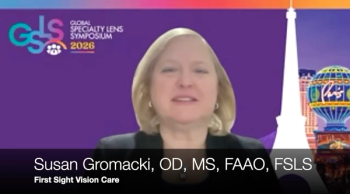
A roundup of legislative news from 2025 so far
What to know about legislative moves that have been made through May this year.
Optometric associations, optometrists, and legislators have hit the ground running in 2025 with a flurry of legislative action. With initiatives including pay reforms, addressing vision plan abuses, and simplifying prescription verification systems, legal advocacy has already taken many forms.
Senator Elizabeth Dole 21st Century Veterans Healthcare and Benefits Improvement Act
A bill signed into law in January provides physician recognition for Department of Veterans Affairs (VA) optometrists, which grants leverage to the department to increase pay awards, bonuses, and annual evaluations to VA eye care providers. With the American Optometric Association (AOA) acting as a longtime advocate for the bill, AOA President Steven Reed, OD, said the passage of the law is a critical win for all optometrists.
"This is huge, not only for the VA ODs, but for all of us," Reed said. "First of all, within the VA system, back in 2004 is when a new law was created that put physicians, the MDs and DOs, in a different pay scale. At that time, the dentists, podiatrists, and optometrists were left off. Over time, though, the dentists and podiatrists were able to be included. But even now, 20 years later, until recently, optometrists were left off. So what that did in the VA system is create some gaps because optometrists don't necessarily have a big motivation to practice in a system where they can't get paid at least comparable to what they could get in the general public. So there are a lot of holes in the system. And then to cap that off, you've got 20% of the VA optometrists at or nearing retirement, so we're about to have a big problem, because VA optometry takes care of the majority of the eye care within that system.
"So we're very proud for them, and it's a huge win. It's very significant. But I mentioned that it's good for us too, and the reason why is that many times when we're fighting these scope battles or these 'not-a-doctor' bills, which are so prevalent, our opposition will say, 'Well, at the VA level, you guys aren't even recognized as physicians, not to mention that we are at Medicare.' They use that against us, but they can't anymore. So we just took away some of the ammunition."
VA ODs provide approximately 70% of essential primary and medical eye care services. Despite the important role optometry plays in VA health care, ODs had been on the general schedule pay scale, which was largely unchanged since 1976.
What to know about VA eye care
- Vision/eye health care is the third-most requested service by veterans.
- It is estimated that there are approximately 130,000 veterans in the United States who are legally blind and more than 1 million veterans who have low vision that causes a loss of ability to perform necessary daily activities.
- As many as 64% of patients with traumatic brain injuries are estimated also to have a vision problem.
HB 3211
A month later, HB 3211 was introduced in Texas to address anticompetitive practices in the vision benefits market. The bill is a continuation of efforts that can be traced to June 2023, when HB 1696 was signed into law. The bill works to prevent abuses, including patient steering, doctor tiering, practice control, chargebacks, and covered services, requiring unrelated information on claims, and extrapolation in audits.
"HB 3211 strengthens patient choice by ensuring that any properly credentialed optometrist who agrees to the [vision benefits manager's] contract terms can participate as an in-network provider—allowing Texans to see the optometrist of their choice when using their vision plan," Tommy Lucas, OD, director of advocacy at the Texas Optometric Association, said in a news release.
Act 142
Other recent VBM news comes from Arkansas, with Act 142 of 2025 being signed into law in late February. Members of the Arkansas Optometric Association (ArOA) recently sat down with Optometry Times to discuss the legislation.
"Everything we do in optometry is legislative, and if we're to advocate for ourselves or our patients, it has to be legislative, and we're going to be the only ones that's going to do that," said Matt Jones, OD, legislative cochair at the ArOA. "So not only was the Arkansas Optometric Association behind this bill—we did this for all eye care providers across the state—but as an affiliate of the American Optometric Association, they were also advocates for this bill. And along with Matt [Burns], Joe [Sugg] and I, we worked with several AOA leaders across the country to help formulate the bill and to help talk through the bill and to make sure that we were on the right path toward advocating for better access for our patients through this VBM bill."
Unfortunately, for as long as I've practiced longer contracts and terms between doctors, these vision plans have become contracts of adhesion, where we have no ability to negotiate," said Joe Sugg, OD, legislative cochair for ArOA. "So they really give a take-it-or-leave-it type of approach, not just in the reimbursement aspect, but many other contractual aspects as well. Obviously, reimbursement is a big, big piece...if doctors don't feel that they can run their practices and get reimbursed appropriately to make a plan make sense, then, unfortunately, they're not going to accept those plans. But now, inherently in optometry, we tend to do it anyway for the good of our patients, whether it makes sense from a business standpoint or not, but not only reimbursement, but just other contractual aspects that we just continue to get squeezed. You try to negotiate these things and just have really no leg to stand on, which is ultimately why we felt something had to be done here to help our patients, ultimately, but also help doctors across the state. This bill also brings more authority for the Department of Insurance to regulate VBMs."
"Previously, it was a little limited, and this brings it under a health benefit plan, or changes that definition so it gives them the ability to regulate these companies, whereas beforehand, that was not the case," said Matt Burns, executive director of ArOA. "So for our doctors, we're going to be implementing education resources from the association to help them with this transition, to make sure that these companies are following the law in conjunction with the Department of Insurance."
The regulations will take effect in August 2025, with additional provisions to roll out based on plan renewals or contract changes or by January 1, 2026.
HB 1267
Most recently, North Dakota secured comprehensive telemedicine provisions as part of its scope of practice legislation.
"Our members' willingness to step up when called upon was truly incredible and we saw the passion our membership has for their profession," Kim Hacker, North Dakota Optometric Association's executive director, said in a release. "We built lasting relationships at the capitol and walked away with a positive reputation, and as many of you know, that's half the battle."
Newsletter
Want more insights like this? Subscribe to Optometry Times and get clinical pearls and practice tips delivered straight to your inbox.















































